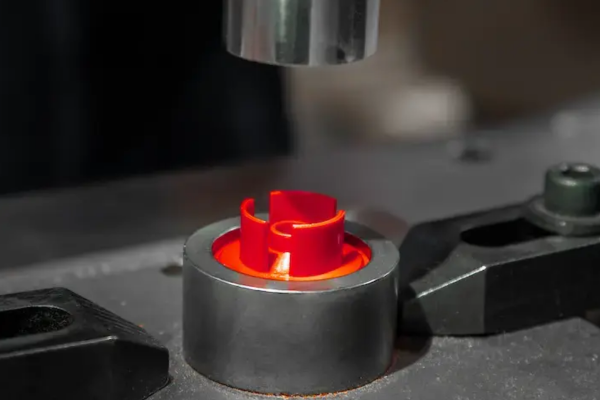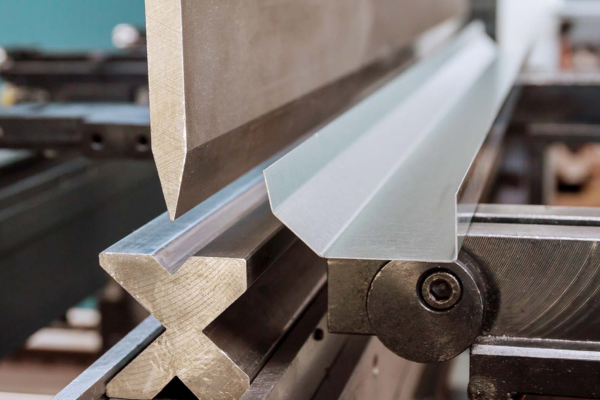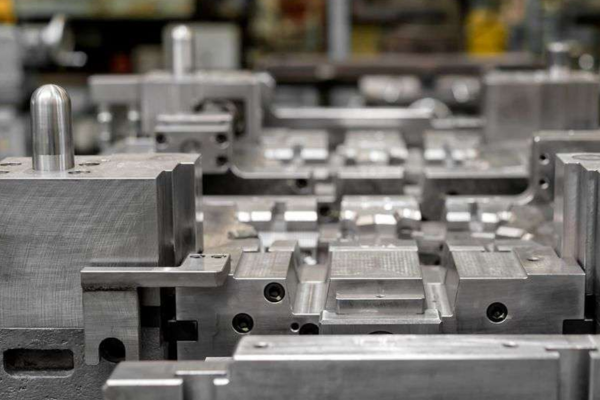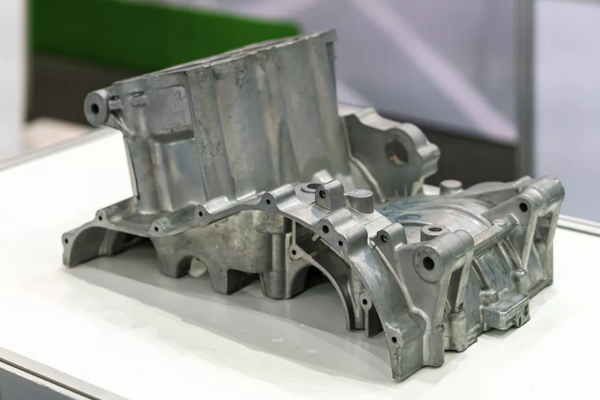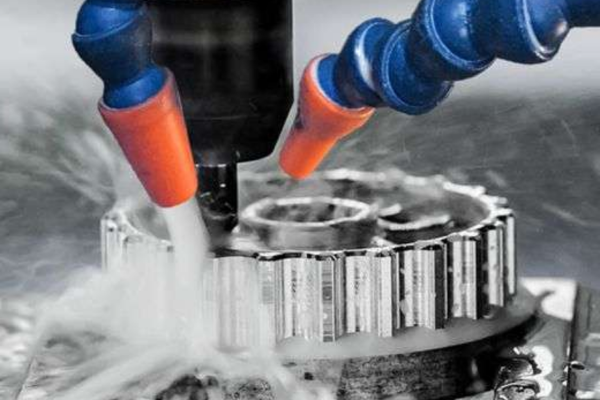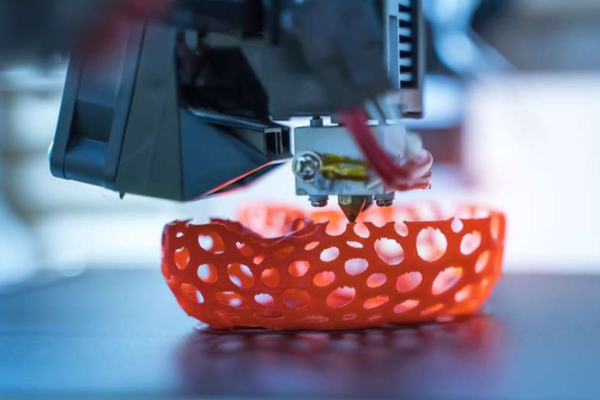Inconel 718 is a nickel-based superalloy designed to withstand extreme heat, pressure, and corrosion. Because of its hardness and work-hardening properties, finishing requires precise processes and skilled handling.
As Machined Finish
Inconel 718 produces a functional as-machined finish with visible tool marks, typically ranging from Ra 3.2–6.3 µm, depending on tool sharpness and cutting conditions. Although not cosmetic, it is suitable for internal components, oilfield tools, aerospace brackets, and parts where functionality matters more than appearance. XC Machining uses carbide tools and optimized feeds to produce clean, consistent as-machined surfaces.
Precision Grinding & Superfinishing
Grinding is commonly used for Inconel 718 to achieve:
- Extremely tight tolerances
- High dimensional accuracy
- Smooth surface finishes
- Stable mating surfaces
Superfinishing can achieve sub-micron Ra values, making it ideal for aerospace rotors, turbine components, and sealing surfaces. XC Machining uses CNC grinders and precision wheel dressing to deliver mirror-quality finishes when required.
Perlstrahlen
Bead blasting produces a uniform, matte surface that removes minor imperfections and machining marks without damaging the superalloy substrate. This is commonly used for:
- Aerospace housings
- Combustion chamber components
- High-performance structural parts
XC Machining controls bead size and pressure to avoid surface work-hardening.
Chemical Cleaning & Passivation
Chemical treatments remove scale, machining residue, and contaminants while enhancing corrosion resistance. Passivation eliminates free iron particles and strengthens the alloy’s natural oxide layer. This is essential for components used in:
- Düsentriebwerke
- Oil & gas equipment
- Nuclear systems
XC Machining partners with certified aerospace finishing labs for NADCAP-grade chemical treatments.
PVD Coating, Nitriding, and High-Temperature Coatings
Advanced coatings improve wear resistance and thermal stability. Options include:
- PVD titanium nitride coatings (TiN, TiCN, CrN)
- Chromizing for oxidation resistance
- Nitriding for surface hardness
These coatings extend part life in extreme environments. XC Machining offers coating guidance based on application temperature, wear conditions, and environmental exposure.
Polishing & Lapping
Polishing is used for applications requiring a reflective finish or ultra-smooth surfaces for fluid flow or sealing. Lapping can achieve extremely tight flatness and low roughness, ideal for valves, aerospace seals, and precision rings. XC Machining’s finishing team delivers highly polished results even on hardened Inconel.
What Are the Challenges When Machining Inconel 718 and How XC Machining Overcomes Them?
Machining Inconel 718 is extremely difficult due to its high-temperature strength, work-hardening behavior, and abrasive nature.
Rapid Tool Wear from Extreme Hardness
Inconel 718 has exceptional strength and abrasion resistance, causing cutting tools to wear rapidly, especially under heat. XC Machining overcomes this by using carbide and ceramic inserts specifically engineered for superalloys. Sharp, high-rake cutting tools are selected to reduce cutting forces, while high-pressure coolant systems, often exceeding 1000 psi, actively cool the tool and assist with chip breaking. Feed rates are carefully optimized to prevent heat buildup, burning, and premature tool failure.
Work-Hardening During Cutting
Inconel 718 becomes substantially harder when cut incorrectly, making each subsequent pass increasingly difficult. XC Machining prevents work-hardening by using heavier, consistent cuts rather than shallow passes and by maintaining constant tool engagement to avoid rubbing. Dwelling and slow cutting speeds are avoided entirely. CAM-optimized toolpaths designed specifically for nickel superalloys ensure efficient engagement and proper chip removal throughout the process.
Heat Buildup Leading to Distortion or Cracking
The alloy retains heat at the cutting zone instead of dispersing it, which can cause thermal distortion, cracking, and rapid tool degradation. XC Machining addresses this challenge through the use of flood coolant combined with high-pressure through-spindle coolant delivery. Coolant-focused roughing strategies are implemented to manage temperature distribution, and toolpaths are programmed to minimize localized heat concentration. Inserts with heat-resistant coatings, such as AlTiN, are used to withstand prolonged high-temperature exposure.
Stringy, Tough Chips That Are Hard to Evacuate
Inconel 718 generates long, tough, stringy chips that tend to wrap around the tool or remain trapped in deep pockets. This can cause tool breakage, surface damage, or machining instability. XC Machining resolves this by selecting insert geometries that promote chip breaking and by using high-pressure coolant to flush chips out of the cutting zone. Trochoidal and adaptive milling strategies improve chip evacuation, while specialized deep-pocket evacuation techniques are applied to keep complex cavities clean.
Achieving Tight Tolerances After Heat Treatment
Heat treatment cycles such as aging or stress relief can alter the dimensional stability of Inconel 718. To maintain precision, XC Machining performs semi-finish machining before heat treatment and reserves final cuts for after the aging process. CMM inspections are conducted at multiple stages to monitor dimensional changes, and stress-relief cycles are integrated after roughing to stabilize the material before final machining.
Slow Machining Speeds Increase Production Time
Because Inconel 718 can only be machined at relatively slow cutting speeds, overall cycle times naturally increase. XC Machining compensates by applying high-efficiency roughing strategies such as HEM (High-Efficiency Milling) and HPC (High-Performance Cutting). Specialized nickel-alloy cutters are used to maximize material removal without sacrificing tool life. Spindle speeds are fine-tuned to achieve the best balance between productivity and tool longevity. Advanced CAM simulation is used to remove unnecessary tool movements and optimize every step of the machining cycle.
Surface Finish Issues on Hardened Inconel
Hardened Inconel 718 can show tearing, chatter marks, or surface micro-cracks if finished improperly. XC Machining eliminates these issues by using vibration-damping fixturing systems that stabilize the workpiece. Finishing passes employ polished, superalloy-specific cutting inserts to generate smooth surface profiles. For applications requiring ultra-fine finishes, lapping and precision grinding are applied to achieve extremely low roughness values. Every surface is verified using optical and digital metrology to ensure aerospace-grade surface integrity.


